Today let’s talk about eggs. I love them. I eat them almost every day. In many ways they are among nature’s most perfect and complete foods. And yet, an egg is not always an egg. How naked is your morning breakfast? Well that depends on just what kind of eggs you choose.
When it comes to eggs, the most important things to consider are the health and life of the chicken who laid it, and what we do to it before it gets to our breakfast plate.
1. Where did this egg come from?
The most naked is an egg from a pastured chicken who eats grass, pecks at grubs and insects, and is allowed to roam. The egg from this chicken is rich in nutrients, its yolk a deep, dark yellow and packed full of the good stuff. Mother Earth News compared the nutritional profile of these pastured eggs to those from conventionally farmed chickens, and found they had:
- 4 to 6 times the vitamin D content
- 2/3 more vitamin A content
- twice the Omega-3 fatty acid content
- 3 times more vitamin E, and
- 7 times more beta carotene
Wow. That egg packs some punch. This egg is definitely an egg.
At the other end of the spectrum is the egg from a factory farmed chicken. Here we’re talking about chickens kept indoors, not allowed to engage in their natural behaviors, not fed their natural diet, and dosed regularly with antibiotics and hormones. Eggs from these chickens are a pale comparison to their nutrient-dense, pastured counterparts. Not so naked.
Of course there are various stages in between these two extremes. I go into a full explanation in Chapter 6 of my book, Eat Naked, if you’d like the full skinny on the source of your eggs.
2. What happened to my egg?
Regardless of where your egg came from, when it comes to keeping it naked, we want to eat the whole egg. Yes, folks, even the yolk. See that list of vitamins above? Every single one of those is found in the yolk, not the white. It’s the most nutrient dense part of the egg, and the fat in it is essential for your body to access all those nutrients, which are fat soluble. You also need that fat to properly digest the protein in the egg white. A naked egg is a whole egg.
In a misguided attempt to void our diets of fat and cholesterol, the egg yolk was demonized and egg whites were all the rage. Sadly, this trend caught on and still hangs tight in some circles. But what about the cholesterol in the yolk? you ask. Shouldn’t we avoid it as much as possible?
 Let me share a few mostly-ignored facts about this maligned nutrient. Cholesterol is vitally important and responsible for many crucial functions in your body, only one of which is to provide repair material for arterial damage. This damage is the result of inflammation, which occurs with diets heavy in sugar and processed foods, not with dietary intake of cholesterol. In fact, your body creates its own cholesterol, so if you eat more your body produces less, or if you eat less your body produces more. So please, eat the whole egg, cholesterol and all. An egg white isn’t whole, and thus isn’t naked.
Let me share a few mostly-ignored facts about this maligned nutrient. Cholesterol is vitally important and responsible for many crucial functions in your body, only one of which is to provide repair material for arterial damage. This damage is the result of inflammation, which occurs with diets heavy in sugar and processed foods, not with dietary intake of cholesterol. In fact, your body creates its own cholesterol, so if you eat more your body produces less, or if you eat less your body produces more. So please, eat the whole egg, cholesterol and all. An egg white isn’t whole, and thus isn’t naked.
And now we come to the liquid egg product. Capitalizing on our collective fear of fat and cholesterol and our never-ending desire for things to be quick and easy, several of these products came on the market, shouting loudly from the refrigerated shelves their claims of zero fat, zero cholesterol, and thus the implicit zero guilt. Here, we have taken a beautifully simple and nutrient-rich food, liquefied it, pasteurized it, removed the most important nutrients, added all sorts of preservatives, emulsifiers, colorings and flavors (even sugar!), and then marketed it as a healthier option than the original. This, my friends, is the food industry at its most devious. A truly perfect and naked food disassembled, rearranged, and reassembled into a shadow of what it once was. This egg is absolutely NOT an egg.
And so we go from a natural, whole food to a a far lesser version, guided by misinformed trends or commercial interests hiding in nifty marketing, and we see that an egg is not always an egg. What eggs are you eating?
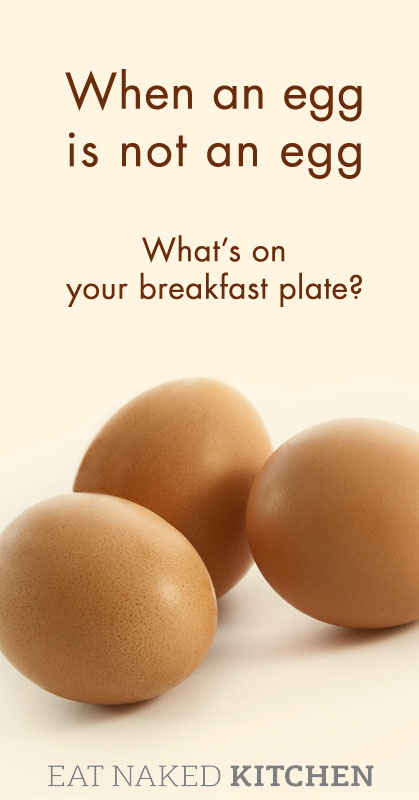

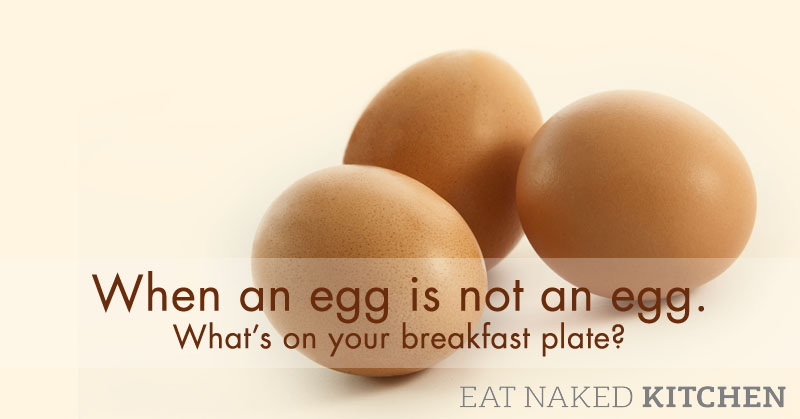
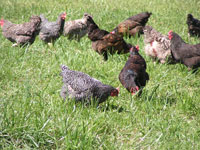
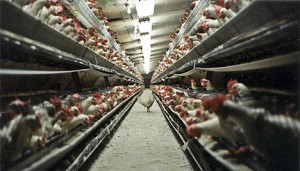

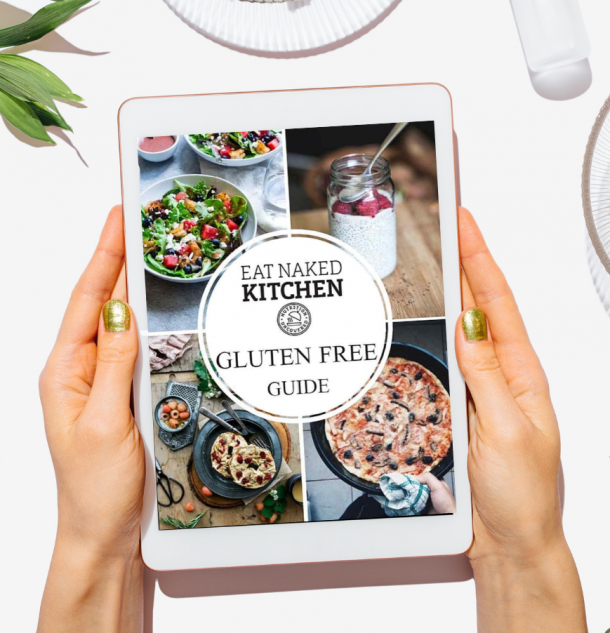
I’m curious to know why two supposedly naked eggs appear different in color & texture. There are multiple sellers at our farmer’s market who sell pastured eggs – one particular farmer has eggs with dense shells, thick whites and nearly-orange yolks. Another particular farmer has eggs with thinner shells, thinner whites and normal yellow yolks.
Is this a difference in where the chickens are pastured, the breed of chickens, or am I not getting the full story from one or other of the farmers?
Which egg is more naked?
Hi Amanda. This is a great question. There could be any of the things you’ve mentioned – what the chickens ate, the particular breed, even the age of the chicken and which laying cycle it’s on will affect the color of yolk and thickness of shell.
The best thing to do is ask the farmers more questions, or better yet, if you can come for a visit. Any farmer that’s doing good stuff will happily invite you to come for a look.
This is great information Margaret. I just love your writing. You explain things so clearly. It’s beautiful.
We switched to pasture raised eggs recently. I notice that the shells seem thicker and the yolks are so orange! I love driving by the pasture and seeing the hens. It feels great to eat a better egg and support a local farmer. My goal is to someday have my own flock but for now, I’ll keep buying Provenance Farm’s eggs. Cost more and worth it!
I hear you, Tara. I’d love to have a couple of chickens, too at some point. talk about local! 🙂
Hi Margaret,
Yikes! I guess it’s time to reconsider the five cartons of egg substitute I have in my fridge. 🙂 Most physicians and the pharmaceutical companies contribute to our belief that the ‘egg’ is bad for us. This only makes it more difficult for us to consider an alternative perspective.
Thanks for the great insight within your post. I’m finding lots of value in what you offer to all of us.
With gratitude and appreciation,
Alicia
Whats the scoop on kosher chicken? I assume it means nothing about how they are raised, just how they’re butchered, is that true?
Yay! We loves eggs from our local farmer, here on da Rock.
Hi,
I really enjoyed reading your article about naked eggs. Thank you!
We have 4 chickens who are allowed to freely roam and scratch around our yard during the day and are locked in the coop at night as we have foxes and snakes around where we live.
Our eggs are so tasty and up until we had our chickens our boys would not eat eggs, they love our girls’ eggs.
Angela
Aaah! Thank you! After watching Forks Over Knives, we were at a loss concerning what to do about our love for, and frequent devouring of, eggs. You laid my heart to rest. Good thing, seeing we’re getting chickens next year, eh?
Just discovered your website – such fabulous info – we are passionate about healthy, whole foods, and this is a perfect compliment for our journey. Look forward to getting the book!
anyone know how i can obtain pastured white shell eggs to me in Brooklyn ?